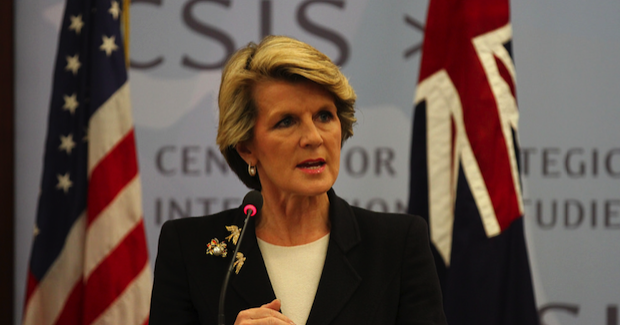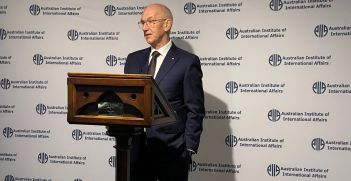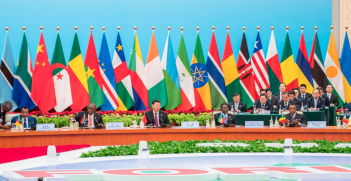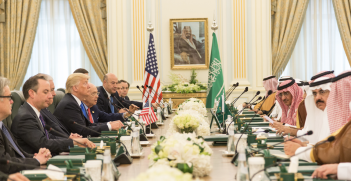Realising Australia's Foreign Policy Potential

The Australian government is in the process of developing its first foreign policy white paper since 2003, intended to guide Australian policymakers over the next decade. As with any policy proposal, the drafters must assess Australia’s limitations and long-term goals as unrealistic aspirations may lead to ineffective policy.
The national interest
The national interest is not a given, nor is it set in stone. A middle power such as Australia, located on the edge of East Asia, will have a different concept of the national interest and its capacity to pursue it than great powers like the United States or China. Even the way national security is conceived can change—as Australia’s abrupt shift from Britain to the US as its principal ‘great and powerful friend’ during World War II demonstrates. The election of Donald Trump and his more transactional approach to friend and potential foe alike means that many of the assumptions about the regional security order, Australia’s place in it, and America’s willingness to continue playing its traditional role as the lynchpin of regional security are in doubt. As a consequence, so too is the way Australia defines the national interest.
The possibility that national interests are both hard to define and capable of change is even clearer in the context of the national economy. Many informed observers think that the nature of complex, transnational production structures has made national trade figures meaningless. Creating a policy framework that unambiguously and exclusively advantages national champions is impossible, as the incoming Trump administration will discover. Indeed, even if the Trump administration’s attitude to security issues was not sufficient reason for rethinking Australia’s overall approach to foreign policy, its attitude to trade relations ought to be. It is possible the Trump regime may trigger an entirely unnecessary and unproductive trade war with Australia’s principal trade partner.
It is important to recognise that more powerful economic actors can have major impacts on the domestic economy and that foreign policy cannot be insulated from wider geoeconomic forces. Thus, geopolitical and geoeconomic forces are increasingly interlinked. Foreign policy needs to recognise this and the fact that smaller economic and strategic actors like Australia are both more exposed to such forces (as our economic reliance on China demonstrates) and less capable of influencing the external environment on which it depends.
Australia’s influence
As a middle power with a limited capacity to influence external events it is important to recognise where Australia’s long-term interests are likely to be best served. Less powerful states such as Australia have an in-principle interest in participating in and helping to develop effective multilateral institutions. The great advantage of multilateral institutions is that they potentially encourage—even force—great powers to behave in ways that they might not otherwise.
The much discussed rules-based international order is potentially a good and vital thing for states like Australia, which risk being bullied and blackmailed without such institutionalised constraints. The United Nations Conference on the Law of the Sea is one potentially important example of a regime designed to influence the behaviour of powerful states. Clearly this has not worked in the case of China and its rather improbable looking territorial claims in the South China Sea. But at least China has ratified the agreement; the US has not, and Australia ought to be exerting a major diplomatic effort to encourage it to do so.
It is all too easy to be deeply sceptical about the value and influence of multilateral institutions, and their record is mixed to be sure. However, Australia could realistically expect to have some sort of impact in its immediate region working with like-minded powers. This is not to say that we should not maintain our membership of the UN, the G20, the WTO and others, but policymakers need to have a keen sense of where scarce diplomatic resources can have the biggest impact.
Importantly, regional powers do not have to start from scratch. There are already a number of existing organisations such as the Asia-Pacific Economic Cooperation (APEC) and the Association of Southeast Asian Nations (ASEAN) Regional Forum that are notionally well placed to deal with regional problems. The key challenge is to make them more effective. This will likely involve managing the sensitivities of the ASEAN states that jealously guard their supposed leadership role. In reality however, it has become painfully clear that ASEAN is incapable of addressing key challenges like the rise of China. Working with other regional powers such as Japan, South Korea and even an increasingly internationally focused Indonesia may be one way of revitalising extant institutions and their unrealised potential.
One important goal to which Australia could contribute is to encourage a rationalisation of the existing institutional architecture. At present, there are simply too many initiatives and organisations with overlapping or competing mandates and purposes. Drastically reducing their number would save all regional states’ diplomatic resources and potentially make the remaining entities more effective and authoritative in the process.
Assets and capabilities
Australia has a limited capacity to influence world events through its material assets. The futility of current policy will likely be revealed by the Trump administration’s transactional approach to allies. No matter how much military hardware Australia buys, this will not guarantee enhanced influence or preferential treatment from our great and powerful friend. More importantly, it will not make Australia any more secure either, as key decisions and the drivers of possible conflict will happen beyond our shores.
Australia’s most important and often neglected asset is its potential to provide new, innovative ways of thinking about a range of issues from climate change mitigation to combatting international terrorism. However, being an effective international actor and ideas broker in this context means having the capacity to act—and be seen to act—independently. At present, too much of the region and the world sees Australia as a very predictable extension of American foreign policy, rather than as an independent power with its own distinctive perspective on international affairs. In such circumstances, it is not surprising that some of the initiatives and ideas that have been generated here are not taken terribly seriously by our neighbours.
Recognising that Australia’s future remains inexorably bound up with the region, and that it is there that we can have the most impact is a good starting point for our future foreign policy priorities. Being a good international citizen ought to mean leading by example, something Australia’s benign strategic geography ought to leave it uniquely well placed to do. Not spending more than we need to on new weapons systems might send a reassuring message to our neighbours and allow them to follow suit.
Working energetically and creatively to address profoundly interconnected regional security and development problems might also prove a much more effective use for scarce taxpayer dollars. Indeed, spending might usefully be redirected into spending more on the human side of our foreign and strategic policies, be it our impoverished diplomatic presence or intelligence-gathering activities.
In short, the world desperately needs examples of states that are well run, stable, prosperous, yet determined to play a constructive international role—rather than simply pulling up the drawbridge. It was a strategy that didn’t always work in mediaeval times; it’s not desirable or possible in an era of globalisation. An independent Australia with a foreign policy to match might offer the world a very useful model of good international citizenship when such things are in short supply.
This is the first of two edited extracts from Mark Beeson’s submission to the forthcoming foreign policy white paper. The second extract will be published next week.
Mark Beeson is AIIA Research Chair and professor of political science and international relations at the University of Western Australia. Dr Beeson was co-editor of the AIIA’s recently published Navigating the New International Disorder: Australia in World Affairs 2011-2015.
This article is published under a Creative Commons Licence and may be republished with attribution.





